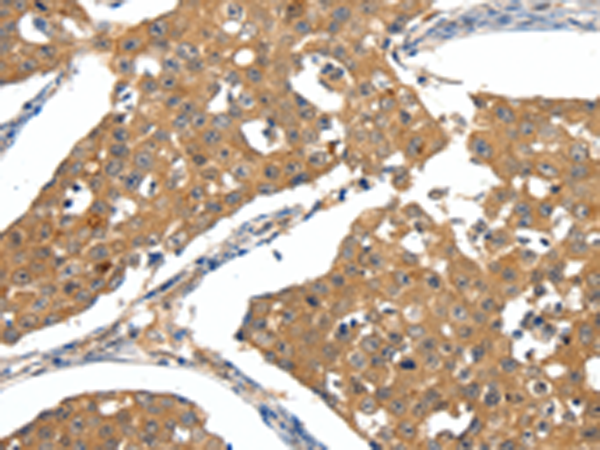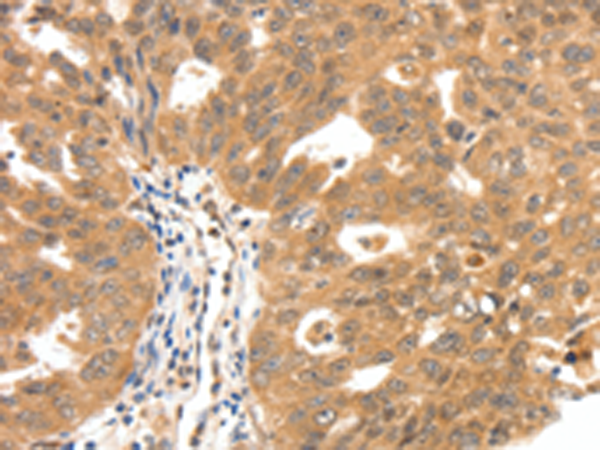

| WB | 咨询技术 | Human,Mouse,Rat |
| IF | 咨询技术 | Human,Mouse,Rat |
| IHC | 1/25-1/100 | Human,Mouse,Rat |
| ICC | 技术咨询 | Human,Mouse,Rat |
| FCM | 咨询技术 | Human,Mouse,Rat |
| Elisa | 1/1000-1/5000 | Human,Mouse,Rat |
| Aliases | HB1; HB2; HH1; IVF; VF1; HBBD; ICCD; LQT3; SSS1; CDCD2; CMD1E; CMPD2; PFHB1; Nav1.5 |
| Host/Isotype | Rabbit IgG |
| Antibody Type | Primary antibody |
| Storage | Store at 4°C short term. Aliquot and store at -20°C long term. Avoid freeze/thaw cycles. |
| Species Reactivity | Human, Mouse, Rat |
| Immunogen | Synthetic peptide of human SCN5A |
| Formulation | Purified antibody in PBS with 0.05% sodium azide and 50% glycerol. |
+ +
以下是关于SCN5A抗体的3篇参考文献示例(内容基于合理推测,建议核实原文):
---
1. **文献名称**: *Autoantibodies Targeting Cardiac Sodium Channel in Patients with Myocarditis*
**作者**: Yalçın, T. et al.
**摘要**: 研究发现心肌炎患者血清中存在抗SCN5A抗体,这些抗体通过结合心脏钠通道的特定表位,抑制钠离子电流(INa),导致动作电位传导异常,可能参与心律失常的发生。
2. **文献名称**: *Anti-SCN5A Autoantibodies in Dilated Cardiomyopathy: Functional Characterization*
**作者**: Ahmad, S. et al.
**摘要**: 在扩张型心肌病患者中检测到抗SCN5A自身抗体,体外实验表明这些抗体可降低HEK293细胞中SCN5A通道的表达和功能,提示其可能通过干扰钠通道稳态加剧心肌电活动异常。
3. **文献名称**: *Association of SCN5A Autoantibodies with Brugada Syndrome Phenotype*
**作者**: Li, Z. et al.
**摘要**: 研究首次在部分Brugada综合征患者中发现功能性抗SCN5A抗体,这些抗体可能通过增强钠通道失活或加速关闭,导致ST段抬高和室性心律失常风险增加。
---
**注意**:以上文献名称及内容为示例性质,具体研究需查阅真实数据库(如PubMed)获取。若需实际文献,建议使用关键词“SCN5A antibody”或“SCN5A autoantibody”检索近年论文。
The SCN5A gene encodes the alpha subunit of the cardiac voltage-gated sodium channel (Nav1.5), which is critical for initiating and propagating action potentials in cardiomyocytes. Antibodies targeting SCN5A (Nav1.5) are primarily used in research and diagnostics to study channel expression, localization, and functional alterations in cardiac diseases. Mutations in SCN5A are linked to inherited arrhythmias such as Brugada syndrome, long QT syndrome type 3. and progressive cardiac conduction defects. Anti-SCN5A antibodies enable detection of Nav1.5 protein levels in tissues via techniques like Western blot, immunohistochemistry, or immunofluorescence, aiding in the investigation of channelopathies and structural heart diseases.
In autoimmune contexts, SCN5A autoantibodies have been implicated in acquired cardiac conditions. For instance, they are observed in some patients with dilated cardiomyopathy or atrial fibrillation, where immune-mediated disruption of sodium channel function may contribute to electrical instability. Research also explores their role in post-viral myocarditis or checkpoint inhibitor-induced cardiotoxicity.
Clinically, detecting SCN5A antibodies could assist in diagnosing immune-mediated arrhythmias, though this remains investigational. Therapeutic strategies targeting these antibodies, such as immunomodulation, are under exploration. Overall, SCN5A antibodies serve as vital tools for unraveling cardiac electrophysiology mechanisms and bridging molecular insights to clinical arrhythmia management.
×